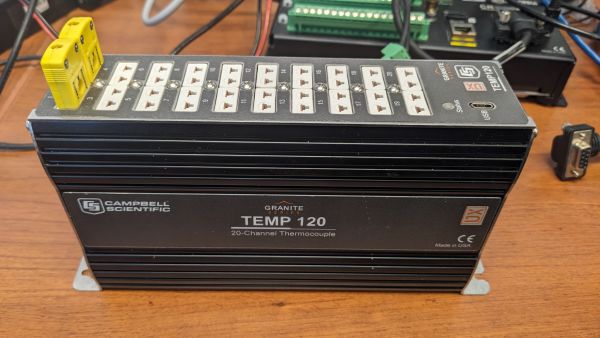How to Optimize Your Data Acquisition
by Michael Adams | Updated: 07/02/2024 | Comments: 0

Think of yourself as a chef in a high-end restaurant, crafting a delicate soufflé. Just as precise temperature control in your oven is crucial to achieving the perfect rise and texture, accurate temperature measurement is vital in scientific and industrial applications. But what if your thermometer was off by just a few degrees? In the culinary world, this could mean a fallen soufflé. In the industrial world, it could mean compromised safety, efficiency, or product quality.
Crafted Precision
In today’s world, where reliable and precise temperature measurements are crucial for various applications, I’d like to take a moment to highlight our Granite™ Temp 120. Why? No matter your application, this purpose-built, 20-channel thermocouple module is set to redefine industry standards.
Leveraging advanced technology and a design ethos shared with the acclaimed Granite Volt 108 and 116 analog input modules and Granite VWire 305 vibrating wire analyzer, the Temp 120 is engineered for excellence. Using our advanced controller area network peripheral interface (CPI) communications protocol, the Temp 120 seamlessly integrates with any CPI-capable automated monitoring platform you are using, including our CR6.
Enhanced Measurement Capabilities
Temperature monitoring is a fundamental aspect of numerous instrumentation fields, impacting asset management, safety protocols, and operational efficiency. The Temp 120 addresses these needs by offering enhanced thermocouple measurement capabilities that are both cost effective and highly precise. By enabling you to densify or expand your thermocouple measurement infrastructure, the Temp 120 provides you with a robust solution to meet your diverse and demanding application requirements.
Designed for You
Designed with meticulous attention to detail, the Temp 120 ensures you get the most accurate measurements possible. With its on-board, 24-bit analog-to-digital (A/D) converter, you’ll experience enhanced resolution and accuracy in your data. Additionally, the Temp 120 boasts the capability to support up to 20 thermocouples at one time, offering unparalleled flexibility in your monitoring setups.
The mini bayonet connectors, each with individual reference-junction temperature compensation, help reduce thermal gradient errors, so you can trust your measurements—even in rapidly changing temperatures. By providing reference-junction correction for each of the 20 input channels, we eliminate channel-to-channel measurement errors that may have resulted from connector temperature differences. This focus on maximum accuracy by minimizing errors means that, even with a quick temperature change of 8°C (46.4°F) per minute, this thermocouple module delivers reliable performance. This makes the Temp 120 the most accurate thermocouple measurement device Campbell Scientific has ever produced, giving you confidence in every reading.
Staying Connected: Your Data, Your Way
One of the standout features of the Temp 120 is its impressive maximum cable length of 853.44 m (2,800 ft), allowing you to place sensors closer to where you need accurate measurements. This significantly reduces errors that can occur with long cables or complex setups, giving you more reliable data. The CPI design also includes a resistive ground, handling differences in ground plane of ±7 V to prevent errors from electrical issues. Simply put, you can trust your data over long distances, as all data packets are protected by checksums to ensure accuracy, saving you time and effort in verifying your measurements.
Built Tough for Your More Demanding Applications
For those of you who are engineers and technicians needing exceptionally durable temperature measurement tools, the Temp 120 Extended Duty (-XD) option provides an extra layer of versatility. You can easily switch this module to CANOut mode, allowing it to send data packets in the CANOut 2.0b format, which is compatible with CAN bus data-acquisition systems. This feature expands the Temp 120's usefulness, enabling you to integrate it into more complex and varied data-acquisition setups, ultimately simplifying your work and enhancing your project's efficiency.
The Future of Temperature Measurement
I hope you've learned how the Temp 120 represents a significant leap forward in temperature measurement technology. Its innovative design, coupled with unparalleled accuracy and flexibility, makes it an indispensable tool for professionals across a wide range of industries. Whether you use it for routine monitoring or extreme conditions, the Temp 120 delivers reliable, high-resolution data, empowering you to confidently make informed decisions.
Recap: How the Temp 120 Can Transform Your Work
Let's be clear: The Temp 120 isn't just another instrument—it's a game-changer in the realm of data acquisition. The Temp 120 stands out because it:
- Uses its on-board, 24-bit A/D converter and individual reference-junction temperature compensation to enhance your measurement accuracy, ensuring precise data collection.
- Has flexible and reliable connectivity that supports versatile setup options with maximum cable lengths of 853.44 m (2,800 ft) and checksum-protected data packets for error prevention.
- Features a CPI design that accommodates ground plane differences of ±7 V, reducing errors from ground loops.
- Operates in extreme conditions and integrates with CAN bus systems using the CANOut 2.0b format to provide you with exceptional durability and compatibility.
Discover how the Temp 120 can optimize your data acquisition. Reach out to our application engineers or sales team today.




 Michael Adams is a Sales Engineer for the infrastructure and geotechnical markets at Campbell Scientific, Inc. He has a degree in Electronic Systems, which he has applied for more than 30 years in system design, field deployment, and system longevity/reliability—with a strong focus on instrumentation and field troubleshooting. When he's not working, Michael can be found cycling, skiing, or flyfishing.
Michael Adams is a Sales Engineer for the infrastructure and geotechnical markets at Campbell Scientific, Inc. He has a degree in Electronic Systems, which he has applied for more than 30 years in system design, field deployment, and system longevity/reliability—with a strong focus on instrumentation and field troubleshooting. When he's not working, Michael can be found cycling, skiing, or flyfishing.
Comments
Please log in or register to comment.